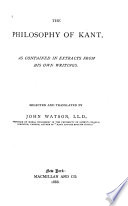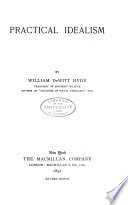 | Immanuel Kant - 1888 - عدد الصفحات: 380
...laws of the will must be capable of being derived. The practical imperative will therefore be this : Act so as to use humanity, whether in your own person...another, always as an end, never as merely a means. 279 The principle, that humanity and every rational nature is an end in itself, is not borrowed from... | |
 | William De Witt Hyde - 1897 - عدد الصفحات: 364
...Utilitarianism," it is stated in the most emphatic and uncompromising manner. Kant's second maxim is, " Act so as to use humanity, whether in your own person...in the person of another, always as an end, never merely as a means." 1 Mill, thanks to his incomparable inconsistency, states the same principle with... | |
 | Immanuel Kant - 1908 - عدد الصفحات: 398
...laws of the will must be capable of being derived. The practical imperative will therefore be this : Act so as to use humanity, whether in your own person...another, always as an end, never as merely a means. The principle, that humanity and every rational nature is an end in itself, is not borrowed from experience.... | |
 | John Watson - 1908 - عدد الصفحات: 536
...consisting in the rational "nature common to all men. Th.us W£_.^fife_the practical, imperative : " Act so as to use humanity, whether in your own person or in the person of another,"aIways~as - — f" * •- — !•• *. . •- - - — . .. — — — -*~ ---•• an... | |
 | Benjamin Rand - 1909 - عدد الصفحات: 832
...laws of the will must be capable of being derived. The practical imperative will therefore be this : Act so as to use humanity, whether in your own person or in the'person of another, always as an end, never as merely a means. The principle, that humanity and... | |
 | James Ward - 1911 - عدد الصفحات: 516
...cited, p. 124 above. maxim which thou canst at the same time will should be a universal law," ie " Act so as to use humanity, whether in your own person...person of another, always as an end, never as merely a means1." It is in this ethical connexion that Kant's most distinguished English commentator, E. Caird,... | |
 | James Ward - 1911 - عدد الصفحات: 516
...cited, p. 1 24 above. maxim which thou canst at the same time will should be a universal law," ie " Act so as to use humanity, whether in your own person...person of another, always as an end, never as merely a means1." It is in this ethical connexion that Kant's most distinguished English commentator, E. Caird,... | |
 | John Henry Muirhead - 1915 - عدد الصفحات: 136
...superseding all naturalistic or merely utilitarian rules. " So act as to treat humanity, whether in thy own person or in the person of another, always as an end, and never as a means only."1 These ideas are sometimes spoken of as transcendental, as though they... | |
 | James Bissett Pratt - 1916 - عدد الصفحات: 116
...Bentham's way of putting it; and Kant merely repeated the same great ideal in his famous imperative : "Act so as to use humanity, whether in your own person...in the person of another, always as an end, never merely as a means." And the Founder of the Christian Religion proclaimed the same ideal when he laid... | |
 | Shailer Mathews - 1918 - عدد الصفحات: 192
...less successful attempt to organize social action in accord with the principle formulated by Kant: "Act so as to use humanity, whether in your own person...the person of another, always as an end, never as a means." Obviously the moral problems set a community which endeavors to put the principle of brotherhood... | |
| |